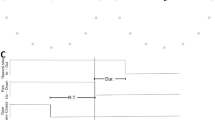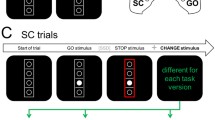Abstract.
We analyzed a set of full-head (66 channels, CTF Inc.) magnetoencephalography (MEG) data recorded when 5 subjects performed rhythmic right index-finger flexion and extension movements on the beat (synchronization) or off the beat (syncopation) with a visual metronome at 1 Hz. Neuromagnetic activities in the alpha (8–14 Hz), beta (15–30 Hz) and gamma (30–50 Hz) ranges were shown to correlate with different aspects of the task. Specifically, we found that, compared with the control condition in which subjects only looked at the visual metronome without making any movement, all the movement conditions were accompanied by a decrease of power in the alpha range (8–14 Hz) in sensorimotor channels of both hemispheres, and an increase of coherence among a subset of these channels. The same comparison showed that power changes in the beta range differentiate task conditions by exhibiting power increases for synchronization and power decreases for syncopation. Changes in the gamma range power were found to be related to the kinematics of movement trajectories (flexion versus extension). These results suggest that three important cortical oscillations play different functional roles in a visuomotor timing task.
Similar content being viewed by others
Author information
Authors and Affiliations
Additional information
Electronic Publication
Rights and permissions
About this article
Cite this article
Chen, Y., Ding, M. & Kelso, S.J. Task-related power and coherence changes in neuromagnetic activity during visuomotor coordination. Exp Brain Res 148, 105–116 (2003). https://doi.org/10.1007/s00221-002-1244-0
Received:
Accepted:
Issue Date:
DOI: https://doi.org/10.1007/s00221-002-1244-0




